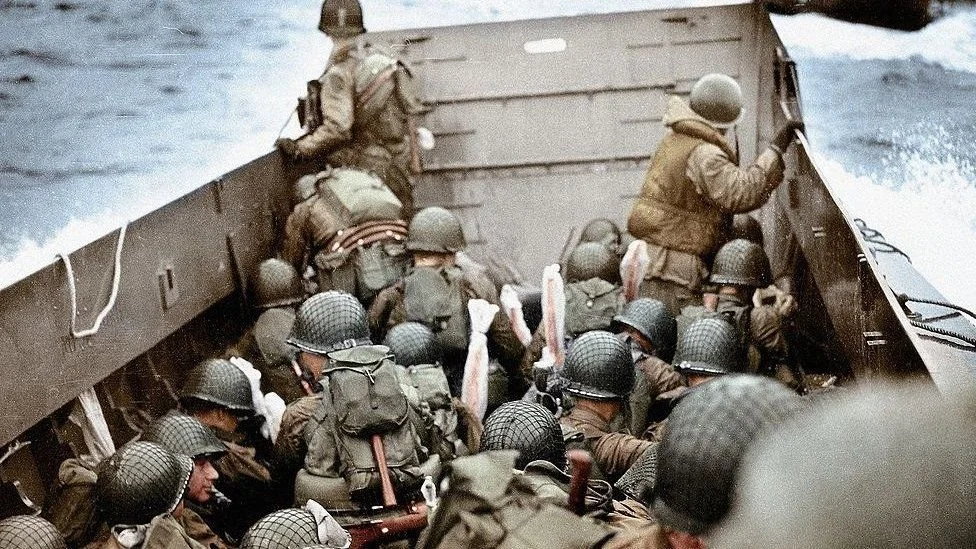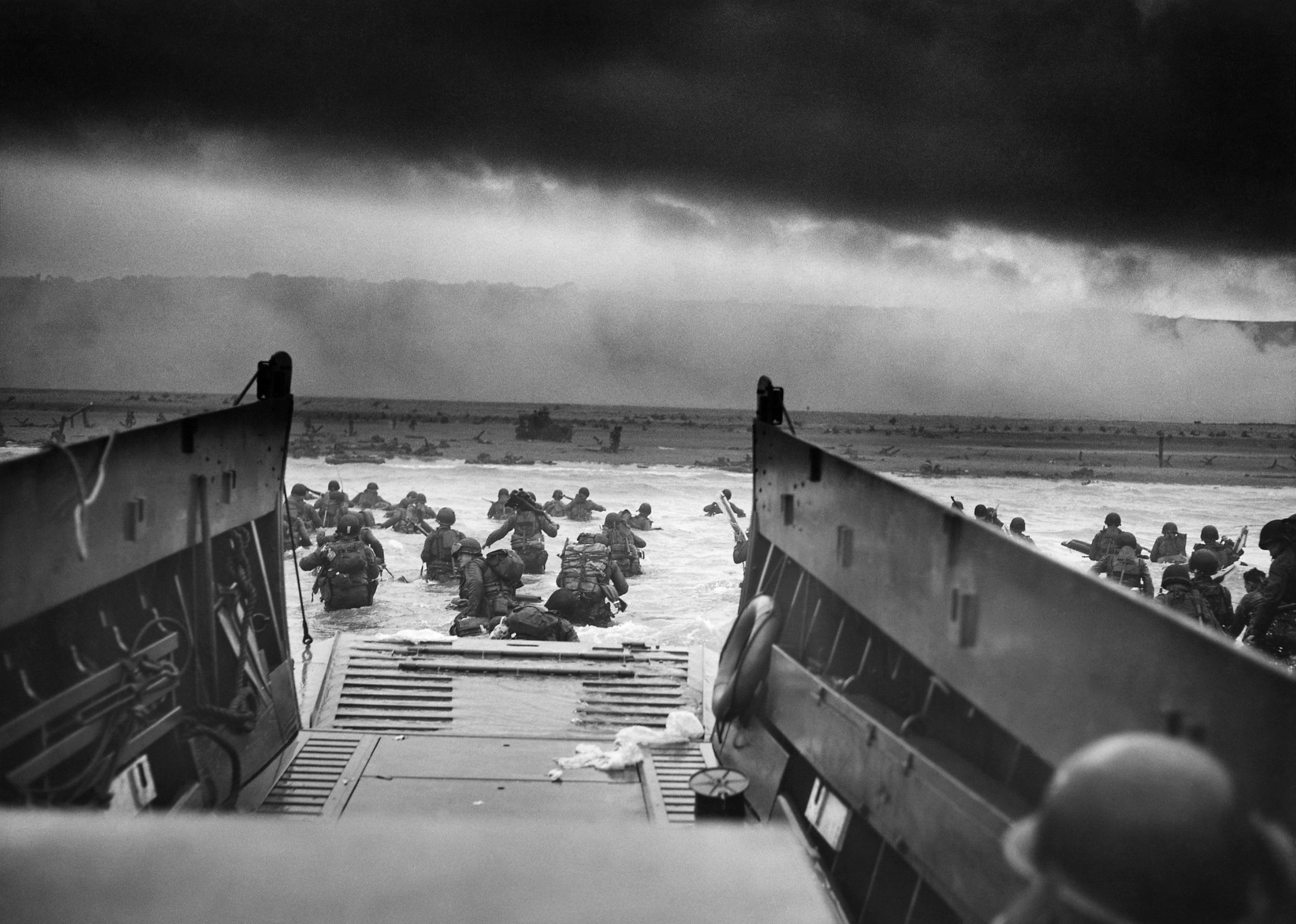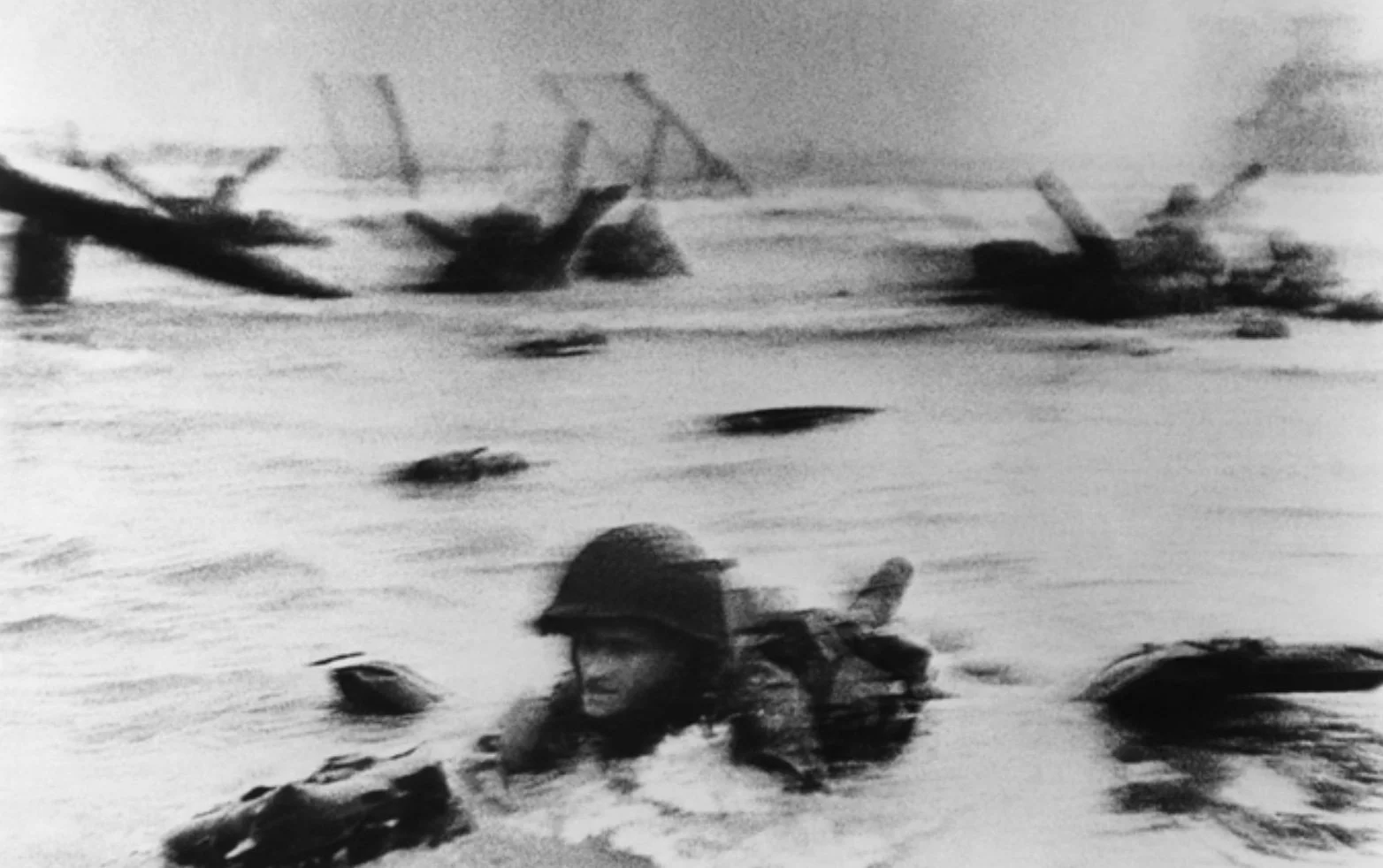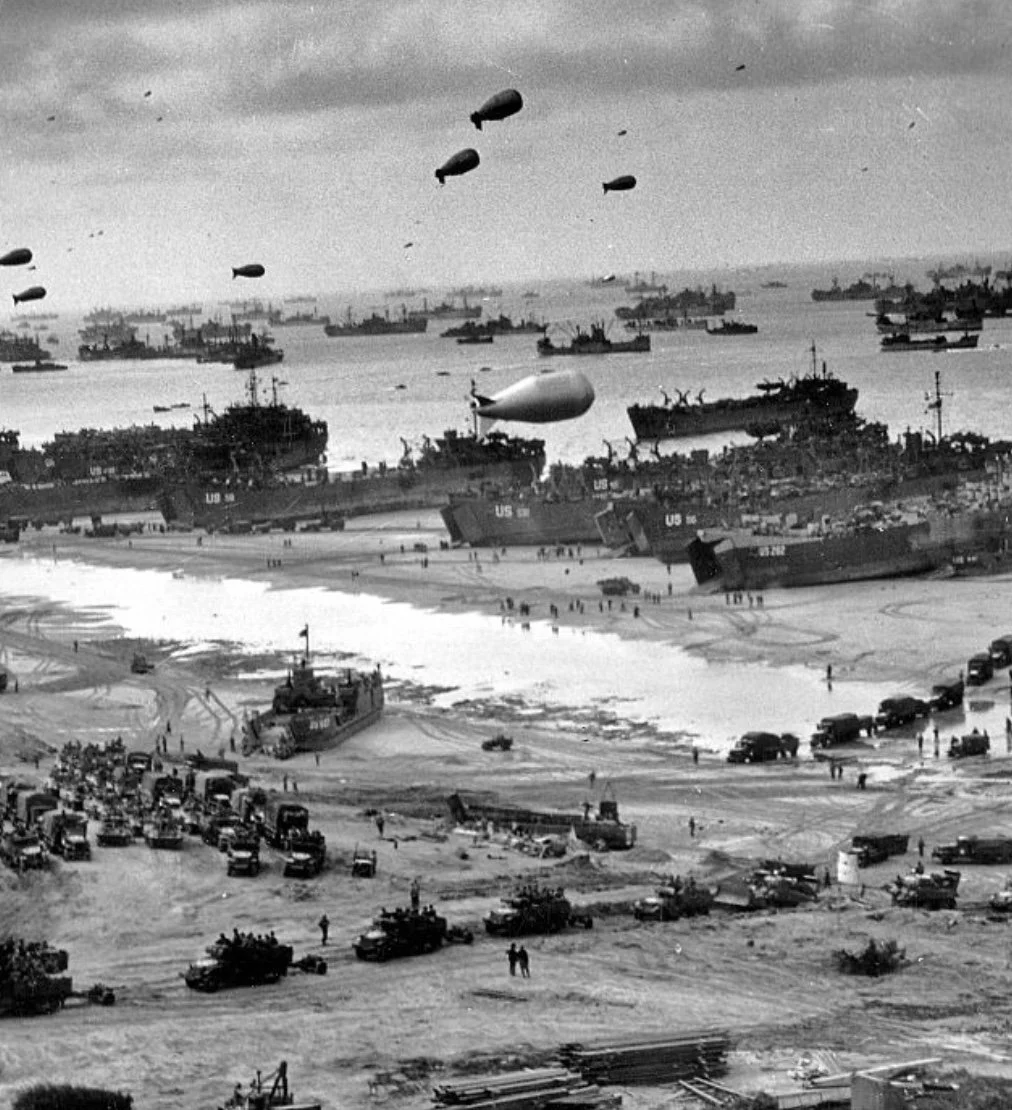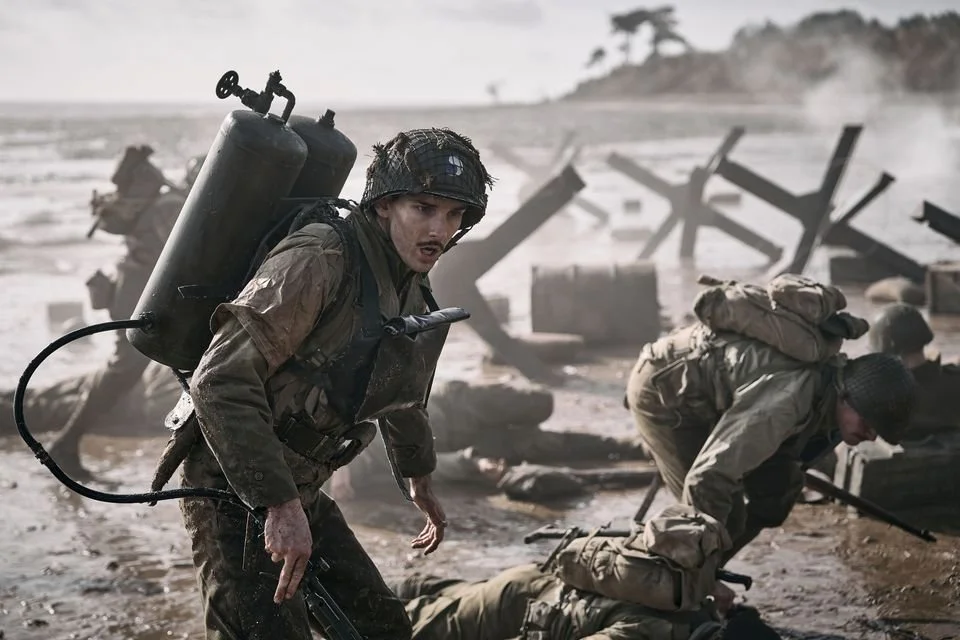Choppy seas and dark, foreboding skies greet landing craft on Omaha beach on 6 June 1944
By The Landlord
“They’re murdering us here. Let’s move inland and get murdered.” — Colonel Charles D. Canham, 116th Infantry Regiment commander
“It was a different world then. It was a world that required young men like myself to be prepared to die for a civilization that was worth living in.” – Harry Read, 6th Airborne Division, British Parachute Regiment
“This operation is not being planned with any alternatives ... If any blame or fault attaches to the attempt, it is mine alone.” – General Dwight D. Eisenhower
“Well, is it or isn’t it the invasion?” – Adolf Hitler to Field Marshal Wilhelm Keitel on June 6, 1944
"So much of the progress that would define the 20th century, on both sides of the Atlantic, came down to the battle for a slice of beach only six miles long and two miles wide.” — Barack Obama, 2009
“I’m very disappointed, and I hate leaving the world feeling this way.” – D-Day veteran Private Jack Port, aged 97 in 2020
“This is a very serious business.” – Photographer Robert Capa on Omaha Beach
Imagine today the likelihood of multiple nations coming together to hatch an incredibly complex, clever, bold, brave, death-defying one-day plan to defy all odds against a powerful force of far-right evil, one that had thrived by twisting truth via media propaganda, and poisoning millions of minds to become an invasive and destructive threat to the security of the entire planet? But imagine 80 years ago, after such an event, with the hope that in a surely far safer future world, such bravery and intelligence and collaboration might be necessary again? Hmm, well ...
So then, on 6 June 1944 unfolded the breathtaking and bloody events of D-Day on the Normandy beaches, and all that followed, the culmination of many months of intricate planning, hidden information and extraordinary courage and coordination. As tributes pour in today on this 80th anniversary from various pompous politicians to croaky comfortable kings, this week the song topic is not only about those events – the landings, the battles, the individuals, the big stories, but also in a wider sense about the very idea of D-Day, of those moments where it's really do or die, or in some cases do and die, where necessity means you must be decisive and take action.
D-Day is a term that is usually military in reference but is often also used in other personal contexts, and could apply to the time for taking action in personal life - over a bad relationship, changing your life, taking a stand, making significant change with a big turning point.
There's millions of jaw-dropping facts about the D-Day landings, and while it essentially applies to 6 June 1944, the term was originally first recorded in the First World War, in a Field Order Number 9, First Army, American Expeditionary Forces, on 7 September 1918: "The First Army will attack at H-Hour on D-Day with the object of forcing the evacuation of St. Mihiel salient."
But back to Normandy. I'm not sure I could ever be in the military or have gone to war, but I suppose we're all part of our own era. And the more you read about the entire event, the more incredible it seems. The various decoys to wrongfoot German intelligence such as Operation Fortitude, in which the British built and positioned dummy equipment including inflatable tanks and parachuted dummies, used double agents and released controlled leaks of misinformation which led the Germans to believe the Allies were going to invade via the Pas-de-Calais and Norway.
The Allied leaders even had to trick their own into keeping secrets. British Lieutenant Colonel Terence Otway, for example, after having briefed his men about the secret D-Day Merville Battery attack, decided to test their sworn secrecy. He apparently sent 30 of the prettiest members of the Women's Auxiliary Air Force, dressed in civilian clothes, into village pubs near where his soldiers were training and to try and seduce them into giving away clues about the mission. None of the men gave anything away, but no doubt they enjoyed the attempts. There was a war on, you know...
Camps in Britain held more than 1.5 million troops, including many from the US and Canada to be rigorously trained, but none were ever told where the action might ultimately be. Then there was the astonishing British airborne campaign which took off on silent gliders on the night of the 5 June with the goal of securing Bénouville Bridge (later known as Pegasus Bridge) just north of Caen, and to ensure progress from Sword beach where the British landed. Meanwhile elsewhere 13,000 American paratroopers also dropped behind enemy lines to capture bridges Both air landings saw instant death, including crash landings by the gliders, or by drowning on in boggy land. All that training wasted in seconds.
After massive bombardment of the German Atlantic Wall in the night, which led to French casualties as well as German, then cam the eventual deployment of vast numbers of boats from the British coast on choppy waters, which had even been delayed for 24 hours, but still so rough that it made most of the soldiers puke, before having to do battle...
A military map showing the plans for D-Day and the spread of US, British and Canadian forces landing across five Normandy beaches
“There has never been a military operation remotely approaching the scale and the complexity of D-Day. It involved 176,000 troops, more than 12,000 airplanes, almost 10,000 ships, boats, landing craft, frigates, sloops, and other special combat vessels—all involved in a surprise attack on the heavily fortified north coast of France, to secure a beachhead in the heart of enemy-held territory so that the march to Germany and victory could begin. It was daring, risky, confusing, bloody, and ultimately glorious," writes journalist Tom Brokaw, in his book The Greatest Generation.
But it's the perspectives of those involved that bring the most colour to the event.
“At that time, we didn't know it was D-Day. We just knew we had a job to do.” recalls Sergeant Tom Jensen, of 626th Engineer Light Equipment Company.
“You get your ass on the beach. I’ll be there waiting for you and I’ll tell you what to do. There ain’t anything in this plan that is going to go right,” declared Colonel Paul R. Goode, in a pre-attack briefing to the 175th Infantry Regiment, 29th Infantry Division.
But the one that stands out most for me is this by David Teacher, of No 71 Royal Air Force Beach Unit, who not only provides grim detail of death and destruction, but also captures a fabulous sense of gung-ho gallows humour by those involved:
"The Germans started to shell the beach at about 9am. Suddenly, all hell let loose. The beach was under fire from shells, mortars and machine guns, we dived for cover. The sea was covered in blood and vomit and flies began to arrive by the thousands, which created another nightmare … We continued all night and the following day without a break. Slowly, slowly we overcame all the nightmares.
There was no lack of humour. A soldier coming ashore asked, ‘Is this a private beach? I was promised a private beach. If not I am not staying.’ And we heard, ‘My mother told me not to travel by air, she thought it was much safer by sea.’ An army officer came ashore and instead of getting his men off the beach quickly, he stopped to consult his map. I approached him, ‘Sir, off this beach, now!’ ‘And who are you?’ he asked. ‘Sorry, no time for introductions.’”
A soldier clambers through the water on Omaha beach. Photographed by Robert Capa
It was indeed a very high cost and risky campaign, and if it had failed, the consequences were unthinkable, leaving few or no alternatives to surprise the enemy again. Thirteen countries were coordinated on the Allied side including Australian, Belgian, Czech, Dutch, French, Greek, New Zealand, Norwegian, and Polish troops, as well as the French resistance, but despite wrongfooting German forces, so difficult were the initial landings, that across the mainly US, British and Canadian forces, casualties were extreme, the worst perhaps being Omaha beach, where 4000 men were killed or wounded, with one US unit landing losing 90% of its men in the first wave.
In all, 156,000 Allied troops landed across five Normandy beaches, with 4500 casualties on that side, as well as thousands of French deaths, and up to twice as many on the German side. Hitler was completely taken by surprise as was his chief commander Rommel, who apparently felt so sure there wouldn't be an invasion that day he went home to give his wife a pair of shoes for her 50th birthday, which takes the meaning of wrongfooting to a whole new level.
A vast array of ships and landing craft after the initial Normandy beach battles
There are many films and documentaries about the events of 6 June 1944, such as The Longest Day (1962, featuring and all-star cast of John Wayne, Sean Connery, Henry Fonda, Robert Mitchum, Richard Todd and Richard Burton) depicting action from different sides and based on a book of the same name by Cornelius Ryan which was derived from 3,000 veteran interviews.
Or there's Steven Spielberg's Saving Private Ryan, which has perhaps the most shockingly realistic first 30 minutes before becoming more of a sentimental Hollywood plotline But perhaps 2001's TV series Band of Brothers takes on the bigger narrative across the whole campaign. Meanwhile this documentary is also full of fascinating insights and footage:
But this week there's also a rather splendid new documentary BBC series, created in collaboration with the Open University, using unheard first-account recordings by Allied and Germans and French participants, often very frank and revealing, and brought to life by actors who resemble the interviewees and mouth the words in perfect sync alongside recreations of events. If you can access BBC iPlayer, follow it all here.
Image from the BBC series D-Day The Unheard Tapes
So then, how is D-Day captured when refracted through the prism of time and song? Can it also mean other deadline days of absolute necessity in other life situations? How might it work in lyrics? The subject must be a primary subject within the song, but can be used in a variety of ways.
Taking not just a historical, but musical perspective on this topic with a keen eye for detail is the marvellous Maki. Place your D-Day songs in comments below for deadline 11pm on Monday, for playlists published next week. There’s no going back …
New to comment? It is quick and easy. You just need to login to Disqus once. All is explained in About/FAQs ...
Fancy a turn behind the pumps at The Song Bar? Care to choose a playlist from songs nominated and write something about it? Then feel free to contact The Song Bar here, or try the usual email address. Also please follow us social media: Song Bar Twitter, Song Bar Facebook. Song Bar YouTube, and Song Bar Instagram. Please subscribe, follow and share.
Song Bar is non-profit and is simply about sharing great music. We don’t do clickbait or advertisements. Please make any donation to help keep the Bar running:

